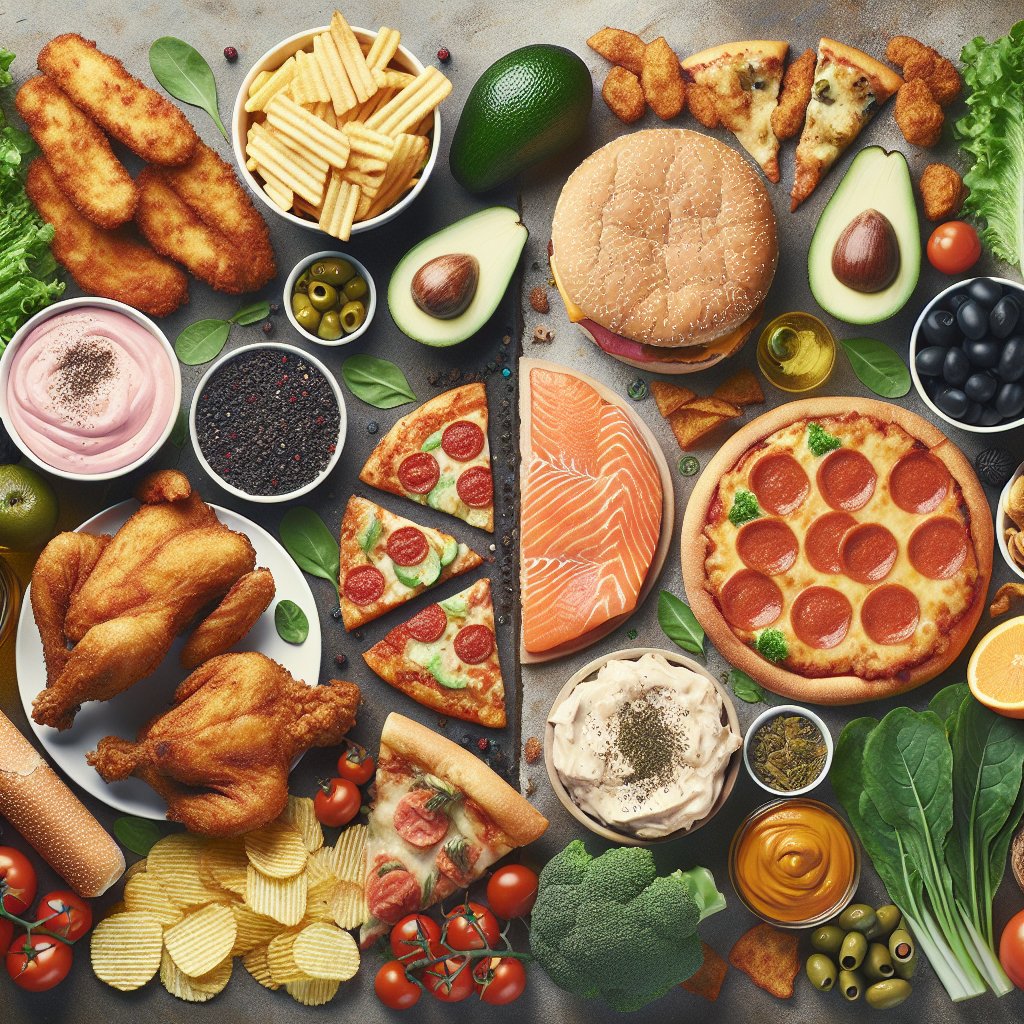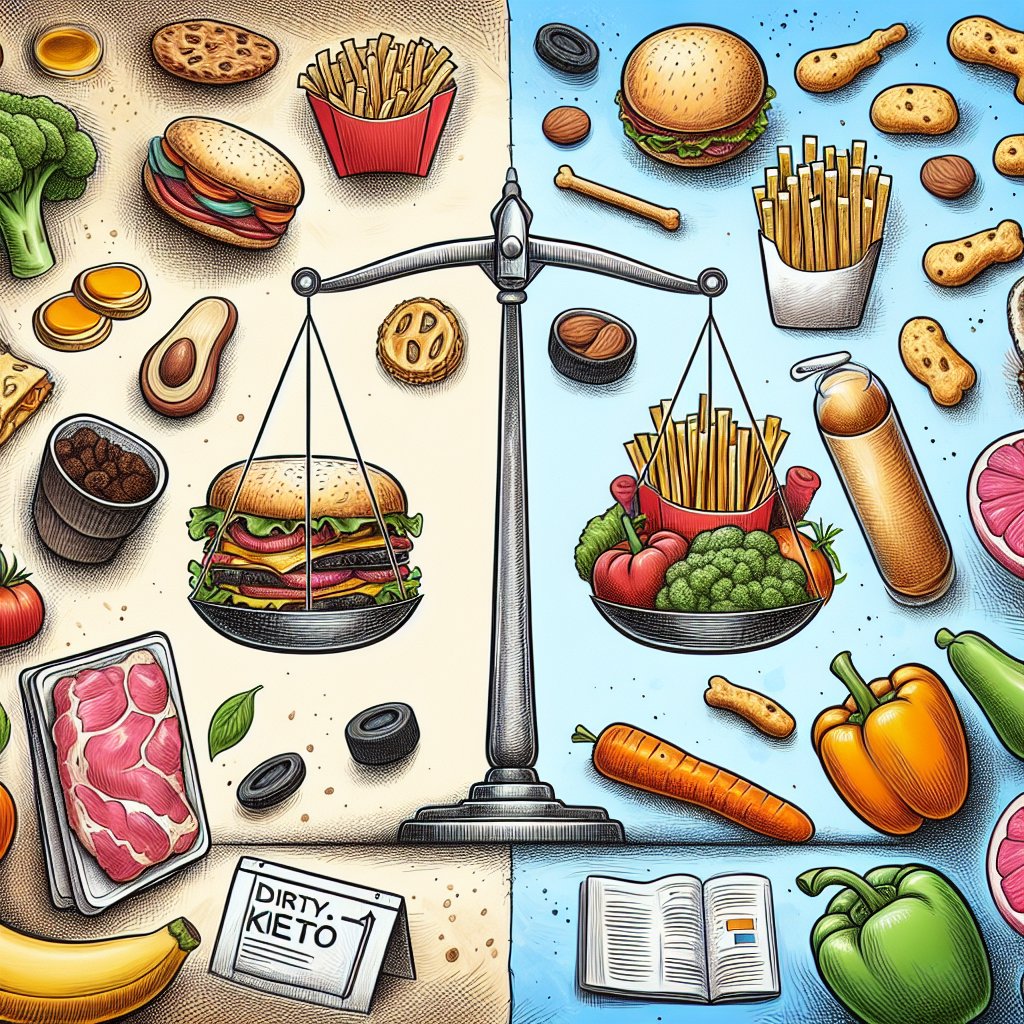Revealed: The Truth About the Dirty Keto Diet Plan – Is It Safe or Risky?
Briefly introduce the concept of the dirty keto diet plan and its popularity
Hey there, fellow keto enthusiast! Today, we’re uncovering the truth about a rather controversial topic in the world of ketogenic diets – the dirty keto diet plan. You’ve probably heard a lot of buzz about it lately. But what exactly is the dirty keto diet, and why is it gaining so much popularity?
The dirty keto diet plan is essentially a variation of the standard ketogenic diet. While traditional keto emphasizes healthy, whole foods like avocados, leafy greens, and grass-fed meats, the dirty keto approach focuses more on meeting macros, regardless of the sources of those macros. This means that people following the dirty keto may indulge in processed and fast foods, as long as they keep their carbohydrate intake low.
The reason behind its popularity lies in its flexibility. Many people find it challenging to stick to a strict, clean keto diet due to lifestyle constraints or personal preferences. With the dirty keto plan, individuals can still achieve ketosis and potential weight loss without feeling as restricted in their food choices.

What is the Dirty Keto Diet Plan?
So, you may have heard about the Dirty Keto Diet Plan and wondered what exactly it entails. Well, let’s break it down. This diet is a variation of the traditional ketogenic diet, but with a focus on consuming processed and fast foods that are low in carbohydrates. In other words, it’s all about staying low-carb, high-fat, but without much concern for the quality of the food.
Now, let’s discuss the dirty keto diet and its approach to food choices.
How Does the Dirty Keto Diet Plan Work?
So, you’ve probably heard about the ketogenic diet and how it can help you lose weight and improve your overall health. But have you heard about the dirty keto diet plan? Let’s dive into the details and uncover what the buzz is all about.
The dirty keto diet plan shares some similarities with the traditional ketogenic diet, but with a unique twist. The premise of the dirty keto diet plan emphasizes the importance of macro nutrient ratios rather than food quality.
Instead of focusing on consuming whole, nutrient-dense foods, the dirty keto diet plan revolves around meeting specific macro nutrient targets, typically high fat, moderate protein, and very low carb intake, without paying much attention to the source of these macro nutrients.
Many proponents of the dirty keto diet plan argue that as long as you stay within your daily macro nutrient limits, you can indulge in processed and low-quality food options while still reaping the benefits of ketosis.

Potential Benefits of the Dirty Keto Diet Plan
Many people are familiar with the traditional ketogenic diet, but the “dirty keto” diet plan has gained attention over the past few years. While it has received some criticism, there are potential benefits to following a dirty keto diet that are worth considering.
Weight Loss
One of the primary benefits often associated with the dirty keto diet plan is weight loss. Research published in The British Journal of Nutrition suggests that the ketogenic diet, in general, can be effective for weight loss due to its ability to promote the body’s natural fat-burning process, known as ketosis. When the body is in ketosis, it burns fat for energy instead of carbohydrates, which can lead to a reduction in body weight and body fat percentage.
Convenience
The dirty keto diet plan offers the benefit of convenience, which can be appealing for individuals with busy lifestyles. This approach to keto allows for more flexibility in food choices and may be easier to maintain in social situations or while dining out. According to a study in the Journal of the Academy of Nutrition and Dietetics, flexibility and convenience are two key factors that contribute to the sustainability of a diet, which may lead to better long-term adherence and results.
Potential Flexibility in Food Choices
Following a dirty keto diet plan may provide greater flexibility in food choices compared to traditional keto. This can be advantageous for some individuals, as it allows for a broader range of food options, making it easier to adhere to the diet. Research in the Journal of Obesity suggests that having more flexibility in food choices within a dietary framework may lead to improved dietary adherence and overall satisfaction with the diet.
While these potential benefits are appealing, it’s important to note that the dirty keto diet plan also has its drawbacks, and individuals considering this approach should carefully weigh the potential advantages and disadvantages.
Addressing the Drawbacks of the Dirty Keto Diet Plan
While the dirty keto diet may appear as a convenient way to stick to your macros, it’s essential to consider the potential drawbacks associated with this approach. Understanding these drawbacks is crucial for making informed decisions about your health and well-being.
Potential Nutrient Deficiencies
One of the major concerns with the dirty keto diet plan is the potential for nutrient deficiencies. Relying heavily on processed and fast foods, the dirty keto diet may lack essential vitamins, minerals, and antioxidants found in whole, nutrient-dense foods like vegetables, fruits, and whole grains. Research published in the Journal of the International Society of Sports Nutrition highlights the importance of a well-rounded, nutrient-dense diet to support overall health and well-being. Therefore, individuals following the dirty keto diet may be at risk of inadequate intake of essential nutrients, potentially leading to adverse health effects over time.
Lack of Long-Term Sustainability
Another drawback of the dirty keto diet plan is its lack of long-term sustainability. The heavy reliance on processed and fast foods may make it challenging to maintain this eating pattern over an extended period. Research in the American Journal of Clinical Nutrition emphasizes the importance of sustainable dietary patterns for long-term weight management and overall health. The dirty keto diet’s emphasis on convenience over quality may hinder its sustainability, potentially leading to fluctuations in weight and overall well-being over time.
Impact on Overall Health
Lastly, the dirty keto diet plan may have an impact on overall health. While it may lead to initial weight loss due to its focus on macronutrient ratios, the quality of the food consumed is equally important. Research in the Journal of Nutrition underscores the significance of dietary quality in promoting overall health and reducing the risk of chronic diseases. Consuming a diet primarily comprised of processed and fast foods, as typical in the dirty keto approach, may have negative implications for heart health, metabolic function, and overall well-being in the long run.
It’s important to be aware of these potential drawbacks and consider them when deciding whether the dirty keto diet plan is the right approach for you.

Comparison to Clean Keto Diet
Let’s delve into the key differences between the dirty keto diet plan and the clean keto diet plan. The distinctions lie in the food quality, nutrient intake, and overall health implications.
Food Quality
Dirty keto primarily focuses on macronutrient intake, often at the expense of food quality. It permits processed and fast foods as long as they are low in carbs. On the other hand, the clean keto diet emphasizes whole, nutrient-dense foods. These include leafy greens, non-starchy vegetables, healthy fats, and high-quality proteins. This distinction is essential as the quality of the food consumed significantly impacts overall health and well-being.
Nutrient Intake
Clean keto promotes a well-rounded intake of essential nutrients. This includes vitamins, minerals, and antioxidants derived from a variety of whole foods. By contrast, dirty keto may lead to micronutrient deficiencies due to its reliance on processed foods, which are often stripped of their natural nutrients during manufacturing.
Overall Health Implications
The health implications of these two approaches differ significantly. Clean keto, with its emphasis on unprocessed and natural foods, not only aids in weight loss and improved energy levels but also supports overall health and wellbeing. Conversely, dirty keto, with its focus solely on macronutrient intake, may lead to potential health risks related to the consumption of processed and unhealthy foods. Research published in the “Journal of Nutrition and Metabolism” has shown that diets high in processed foods can increase the risk of chronic diseases, such as heart disease and type 2 diabetes.
In summary, while both approaches align with the macronutrient principles of the ketogenic diet, the stark contrast in food quality, nutrient intake, and overall health implications sets them apart. It’s crucial to prioritize clean, nutrient-dense foods to support your long-term health and wellness journey on the ketogenic diet.
Expert Opinions and Recommendations
Now that we’ve delved into the specifics of the dirty keto diet plan, it’s essential to consider the efficacy and safety of this dietary approach. To provide a comprehensive view, I reached out to nutritionists and health professionals for their insights and recommendations.
Efficacy and Safety of the Dirty Keto Diet Plan
Nutritionists and health professionals express mixed opinions regarding the efficacy and safety of the dirty keto diet plan. While some believe that it may lead to short-term weight loss and initial metabolic benefits due to the low-carb nature of the diet, others express concerns about the potential long-term health risks associated with the consumption of processed and unhealthy foods. It’s important to note that research on the dirty keto diet specifically is limited, making it challenging to assess its long-term effects comprehensively. However, studies on the potential impacts of highly processed foods on health and weight management are abundant.
A study published in the New England Journal of Medicine stated that the consumption of highly processed foods, a hallmark of the dirty keto diet, is associated with overeating and weight gain. It emphasized the importance of whole, unprocessed foods for overall health and weight management. In contrast, another study published in The Lancet suggests that the reduction of carb intake, a key element of the dirty keto diet, may lead to favorable metabolic outcomes. However, it’s crucial to approach these findings with a critical eye and consider the broader context of a person’s dietary choices and overall lifestyle.
Recommendations for Individuals Considering the Dirty Keto Diet Plan
Based on the insights received, it’s evident that the dirty keto diet plan presents both potential benefits and risks. For individuals considering following this dietary approach, health professionals recommend exercising caution and thoughtful consideration.
Nutritionists emphasize the importance of prioritizing whole, nutrient-dense foods for overall health and sustained weight management. They advocate for a focus on quality fats, lean proteins, and an abundance of non-starchy vegetables, even within the framework of a ketogenic diet, to support optimal health and well-being. Incorporating a variety of colorful vegetables, nuts, seeds, and healthy fats not only provides essential nutrients but also helps in creating a more sustainable and balanced approach to the ketogenic diet.
It’s also crucial for individuals to be mindful of their overall food choices, aiming to minimize the consumption of highly processed and unhealthy foods even while following a ketogenic approach. Additionally, consulting with a healthcare professional or a registered dietitian before embarking on any significant dietary changes, including the adoption of the dirty keto diet plan, is strongly recommended. They can provide personalized guidance based on individual health status, dietary preferences, and lifestyle factors to ensure a safe and effective approach to achieving dietary goals.

Conclusion
After exploring the ins and outs of the dirty keto diet plan, it’s clear that this approach to keto comes with its own set of pros and cons. Let’s summarize the key points discussed in the article and provide a final thought on the implications of adopting a dirty keto diet plan.
Key Points
Throughout this article, we delved into the concept of the dirty keto diet plan, which involves focusing solely on macronutrients at the expense of food quality. While it may lead to short-term weight loss and ketosis, there are potential downsides to consider. The emphasis on processed and unhealthy foods could result in nutrient deficiencies, inflammation, and long-term health issues. Additionally, the lack of emphasis on micronutrients and fiber can impact overall health and well-being.
We also discussed the importance of focusing on nutrient-dense, whole foods in a standard keto diet, which promotes overall health and provides essential vitamins, minerals, and antioxidants. Research has shown that a well-rounded ketogenic diet, rich in whole foods, can have numerous health benefits, ranging from weight management to improved heart health and blood sugar control.
Final Thoughts
As we wrap up this discussion, the implications of adopting a dirty keto diet plan should be carefully considered. While it may offer a quick fix for weight loss and ketosis, the potential long-term consequences on overall health cannot be overlooked. Choosing nutrient-dense, whole foods over processed alternatives aligns more closely with the principles of a healthy ketogenic diet. Embracing a clean approach to keto not only supports weight management and ketosis but also promotes optimal health and well-being.
Ultimately, the decision to follow a dirty keto diet plan or opt for a cleaner, whole-food approach comes down to personal choice and individual circumstances. It’s essential to be mindful of the potential trade-offs and prioritize long-term health when making dietary decisions. By focusing on quality, nutrient-dense foods and maintaining a well-rounded ketogenic diet, individuals can harness the full benefits of keto while safeguarding their overall health.
While the dirty keto diet plan may hold some appeal, especially for those seeking quick results, it’s crucial to weigh the potential risks against the short-term benefits. Considering the abundance of delicious and nutritious whole foods that can be enjoyed on a cleaner ketogenic diet, the path to sustainable wellness and vitality becomes even more enticing.
In conclusion, approaching the ketogenic diet with a focus on whole, nutrient-dense foods not only aligns with the principles of a healthy lifestyle but also sets the stage for long-term success, vitality, and well-being.


